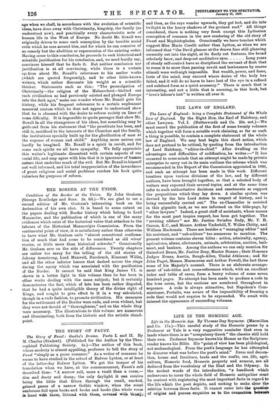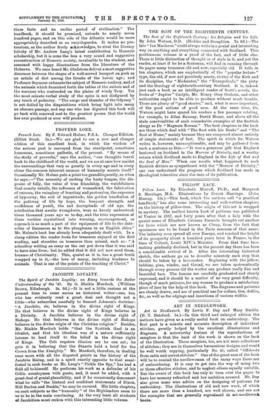LIFE IN THE HOMERIC AGE.
Life in the Homeric Age. By Thomas Day Seymour. (Macmillan and Co. 17s.)—This careful study of the Homeric poems by a Professor at Yale is a very suggestive reminder that even in lands where there is no "compulsory Greek" the classics still hold. their own. Professor Seymour knows his Homer as the Scripture- reader knows his Bible. His "point of view has been philological, not archaeological. From the poet's language he has attempted to discover what was before the poet's mind." Dress and decora- tion, house and furniture, trade and the crafts, sea, life, agri- culture, Homeric food, Homeric property and armour, are all deduced from the vocabulary of the Iliad and the Odyssey. An• the modest words of the introduction, a handbook which endeavours to cover the whole field of Homeric antiquities must be content with registering the most important facts in regard, lo the life which the poet depicts, and seeking to make clear tbe relation between these facts. It cannot enter into the question of origins and pursue enquiries as to the 43044),y:410a between these facts and an earlier period of civilization." The handbook, it should be premised, extends to nearly seven hundred pages, and on this side of the Atlantic would be more appropriately described as an encyclopaedia. It makes no pre- tensions, as the author freely acknowledges, to rival the literary felicity of Mr. Andrew Lang's latest contribution to Homeric scholarship, but it is none the less a very sound and suggestive reconstruction of Homeric society, invaluable to the student, and seasoned with happy illustrations from the literature of the Hebrews. We once heard Mr. Gladstone deliver a most suggestive discourse between the stages of a well-served banquet on pork as an article of diet among the Greeks of the heroic age ; and Professor Seymour exhausts the subject of Homeric cookery, and of the animals which furnished forth the tables of the suitors and of the warriors who contended on the plains of windy Troy. Yet the most minute verbal study of the epics is not disfigured by any touch of pedantry. "The surge and thunder of the Odyssey" is not dulled by the disquisitions which bring light into many an obscure passage, and any ene who has digested this book will go back with renewed zest to the greatest poems that the world has ever produced or ever will produce.





















































 Previous page
Previous page